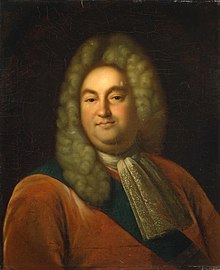Peter Pavlovich Schafirow
Baron Peter Pavlovich Schafirow ( Russian Пётр Павлович Шафиров ; * 1669 ; † 1739 in Saint Petersburg ) was the Russian Vice Chancellor under Peter I.
Life
Shafirow was born in 1669 as the son of a Jewish commissioner from Poland . After his baptism, Alexei I raised him to the nobility. Peter P. Schafirow was initially employed by a cloth merchant and then became a copyist in the tsar's office, where he stood out for his intelligence and hard work. He also spoke six languages, including Latin, and accompanied the Tsar on his first trip to Western Europe.
After his return to Russia he became director of the post office and secret council at the legation prikas . He worked z. B. a marriage contract for Peter the Great .
After the Battle of Poltava in 1709, he rose to become Vice Chancellor and exercised significant influence on foreign policy. Before the Battle of the Prut , he and Chancellor Gabriel Iwanowitsch Golowkin advised against the advice of foreign officers to march on into enemy territory, which ended with the encirclement of the Russian army. In this situation, the Tsar's mistress, Katharina , is said to have given Shafirov her gold and her jewels, whereupon he bribed the Turkish Grand Vizier with these things and 3,000 rubles (according to the English ambassador Whitworth) or 200,000 ducats (according to Moreau). The truth of this story is however doubted. In any case, Shafirov and the son of General Sheremetyev were held hostage in the Turkish Jedi Kule as guarantors of compliance with the treaty concluded with the Ottomans. The Russian envoy Pyotr Andreevich Tolstoy was already there . Shafirov was rarely received with honor by the Sultan. The rest of the time he spent in a dungeon, where he was plagued by unpleasant smells and a lack of light. There are also fears of death in the letters he wrote to Russia. Finally, with the support of English and Dutch diplomats, he succeeded in creating a new peace treaty for a period of 25 years on April 5, 1712, which, however, was not ratified until October 7 of the following year and brought him freedom. In Russia he was received with great honor, made a baron and awarded the Order of St. Andrew . He then lived in the Petersburg Palace. His daughters married the princes Dolgoruki, Gagarin, Khowansky and Saltykov. His son Isaiah became chamberlain.
Further foreign policy impulses were the attempts to persuade the European states to recognize Peter I as emperor. Shafirov also took part in the Tsar's trip to Paris in 1717. Here he negotiated with Marshal d'Huxelles and made the proposal to create a loyalty alliance with the help of defensive agreements and a stop of the French subsidy payments to Sweden . However, the negotiations were largely unsuccessful.
He got more and more involved in intrigues, with his enemy Alexander Danilowitsch Menshikov , and embezzled public funds. An extraordinary court sentenced him to death on February 23, 1723. A mock execution took place three days later, during which the executioner dropped the ax next to him on the execution block. In view of his longstanding and important services to the tsar, he was banished and his property confiscated. He was exiled first to Siberia , then to Novgorod . After the death of Peter the Great, Shafirov was released from prison and commissioned to write a biography of the deceased. His former subordinate and successful rival Heinrich Johann Friedrich Ostermann (Andrej Osterman) successfully prevented Shafirow from holding high office in the last years of his life.
literature
- Henry Vallotton : Peter the Great. Russia's rise to great power . 2nd, revised edition. Callwey, Munich 1978, ISBN 978-3-7667-0430-6 (Original title: Pierre le Grand . Paris 1958. Translated by Eleonore Seitz and Hermann Rinn).
| personal data | |
|---|---|
| SURNAME | Schafirow, Peter Pavlovich |
| ALTERNATIVE NAMES | Шафиров, Пётр Павлович (Russian) |
| BRIEF DESCRIPTION | Russian Vice Chancellor |
| DATE OF BIRTH | 1669 |
| DATE OF DEATH | 1739 |
| Place of death | St. Petersburg |
